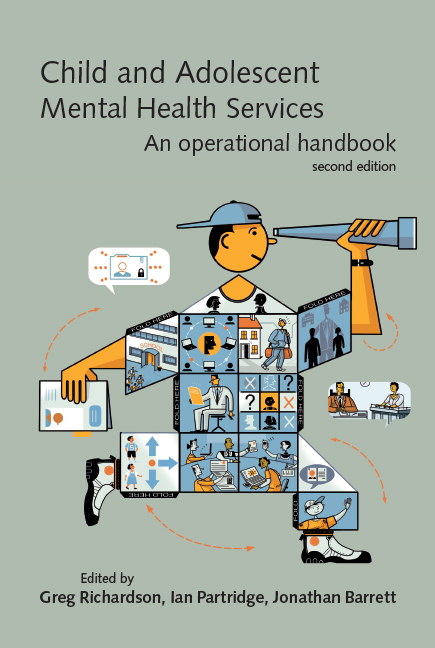Book contents
- Frontmatter
- Contents
- Tables, boxes and figures
- Contributors
- Abbreviations
- Preface
- 1 Introduction
- 2 CAMHS in context
- 3 CAMHS and the law
- 4 Structure, organisation and management of CAMHS
- 5 Evidence-based practice
- 6 Clinical governance
- 7 Education, supervision and workforce development
- 8 Multidisciplinary working
- 9 User and carer participation and advocacy
- 10 A comprehensive CAMHS
- 11 Referral management
- 12 Demand and capacity management
- 13 Strategies for working with Tier 1
- 14 Structuring and managing treatment options
- 15 CAMHS in the emergency department
- 16 Paediatric liaison
- 17 Self-harm
- 18 Learning disability services
- 19 Services for autism-spectrum disorders
- 20 Attentional problems services
- 21 Eating disorder teams
- 22 Bereavement services
- 23 CAMHS for refugees and recent immigrants
- 24 CAMHS and looked-after children
- 25 Drug and alcohol teams
- 26 Parenting risk assessment service
- 27 Court work
- 28 Tier 4 options
- 29 In-patient psychiatric care
- 30 Forensic services
- 31 Neuropsychiatry and neuropsychology services
- 32 Mental health provision for deaf children: study of a low-incidence service provision
- 33 Chief Executives – what do they want and how do they get it?
- Index
18 - Learning disability services
- Frontmatter
- Contents
- Tables, boxes and figures
- Contributors
- Abbreviations
- Preface
- 1 Introduction
- 2 CAMHS in context
- 3 CAMHS and the law
- 4 Structure, organisation and management of CAMHS
- 5 Evidence-based practice
- 6 Clinical governance
- 7 Education, supervision and workforce development
- 8 Multidisciplinary working
- 9 User and carer participation and advocacy
- 10 A comprehensive CAMHS
- 11 Referral management
- 12 Demand and capacity management
- 13 Strategies for working with Tier 1
- 14 Structuring and managing treatment options
- 15 CAMHS in the emergency department
- 16 Paediatric liaison
- 17 Self-harm
- 18 Learning disability services
- 19 Services for autism-spectrum disorders
- 20 Attentional problems services
- 21 Eating disorder teams
- 22 Bereavement services
- 23 CAMHS for refugees and recent immigrants
- 24 CAMHS and looked-after children
- 25 Drug and alcohol teams
- 26 Parenting risk assessment service
- 27 Court work
- 28 Tier 4 options
- 29 In-patient psychiatric care
- 30 Forensic services
- 31 Neuropsychiatry and neuropsychology services
- 32 Mental health provision for deaf children: study of a low-incidence service provision
- 33 Chief Executives – what do they want and how do they get it?
- Index
Summary
‘For the world's more full of weeping than we can understand.’
William Butler Yeats (1865–1939)Introduction
Approximately 2–3% of the general population has some form of intellectual disability (Department of Health, 2001). The prevalence of severe intellectual disability (IQ <50) is 3–4 per 1000, and that of moderate intellectual disability (IQ 50–70) is 30–40 per 1000 (Felce et al, 1994).
There is abundant evidence that children with intellectual disabilities are at significantly increased risk of developing mental health problems (Dykens, 2000; Stromme & Diseth, 2000; Tonge & Einfield, 2000; Emerson, 2003; Whitaker & Read, 2006) and that this affects between 40 and 75% (Corbett, 1985; Gillberg et al, 1986; Wallace et al, 1995). Emerson & Hatton (2007) estimate that children with intellectual disabilities are six times more likely to have a diagnosable psychiatric condition than other children in Britain. They are also at increased risk of having specific disorders such as autism-spectrum disorders (Fombonne, 1998; Emerson & Hatton, 2007) and ADHD (Dykens, 2000). Mental health services for children and young people with an intellectual disability and their families should therefore be readily available and of a high quality. In the UK, the government (Department of Health, 1992) and the Royal College of Psychiatrists (1992) have long recognised this. Despite this and the fact that Standard 8 of the NSF for children states that Local Authorities, primary care trusts and CAMHS must work together to ‘ensure that disabled children have equal access to CAMHS’ (Department for Education and Skills & Department of Health, 2004), only 60% of primary care trusts had commissioned CAMHS for young people with intellectual disabilities in June 2006 (Department for Education and Skills & Department of Health, 2006). This chapter may therefore have a practical role to play as commissioners and services seek to address this gap in service provision.
Organisation of services
It is first necessary to decide where mental health services for children and young people with intellectual disabilities will sit organisationally. Historical models often placed such services within all age services for people with intellectual disabilities. It was argued that this gave rise to good continuity of care. In recent times, dedicated children's services have become accepted as more appropriate.
- Type
- Chapter
- Information
- Child and Adolescent Mental Health ServicesAn Operational Handbook, pp. 169 - 181Publisher: Royal College of PsychiatristsFirst published in: 2017



